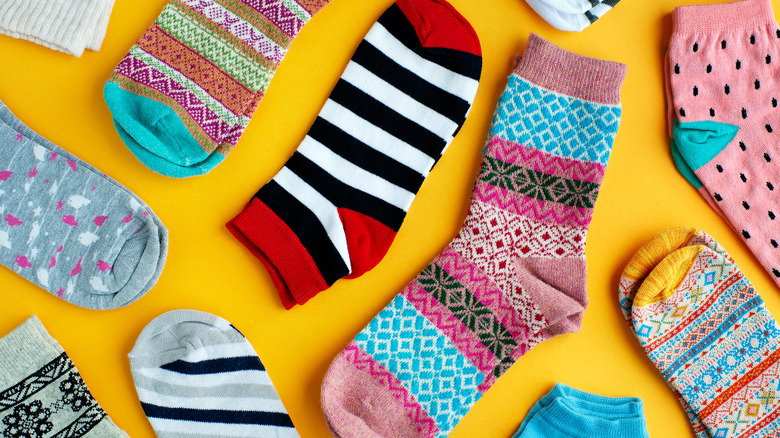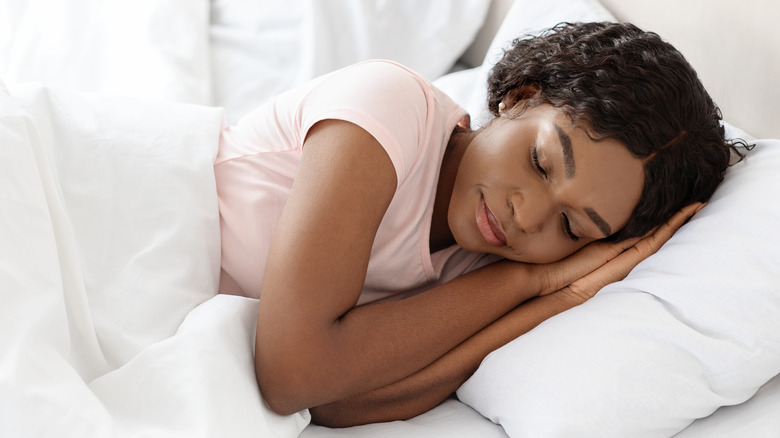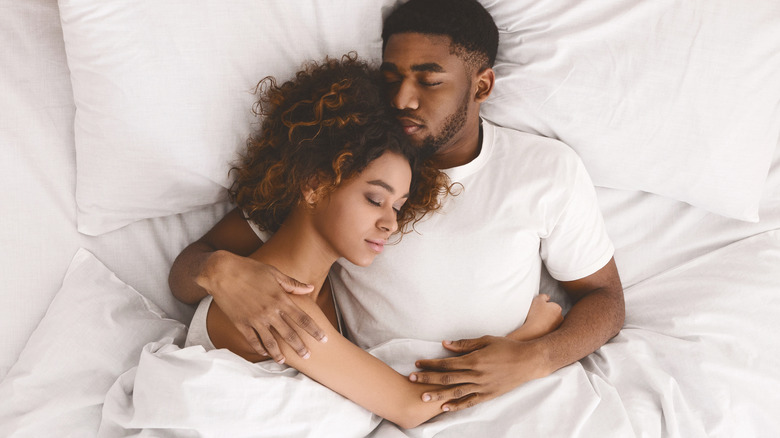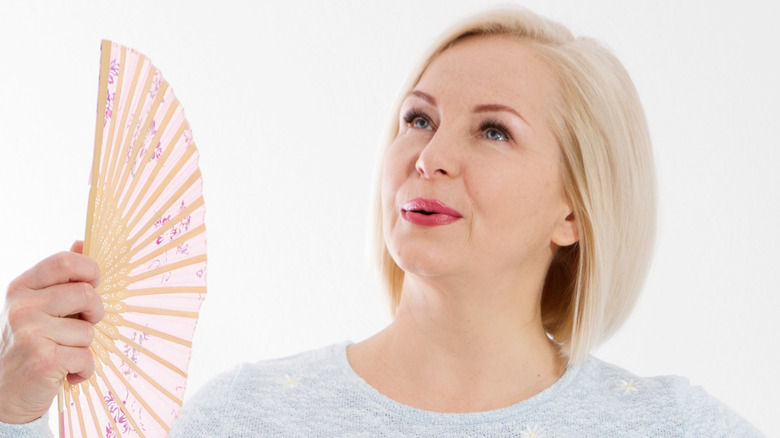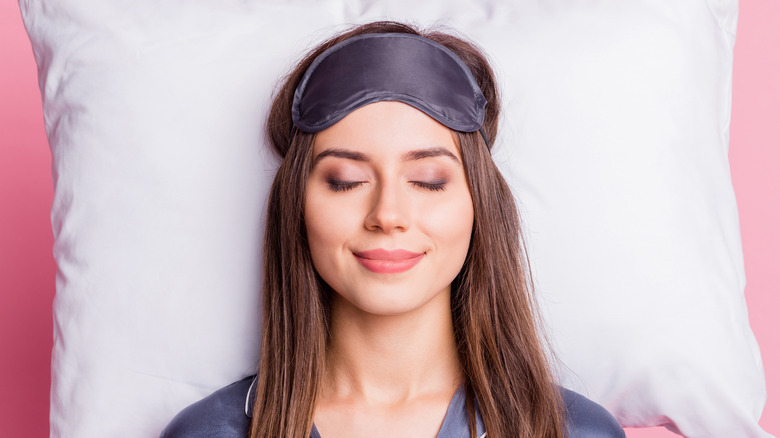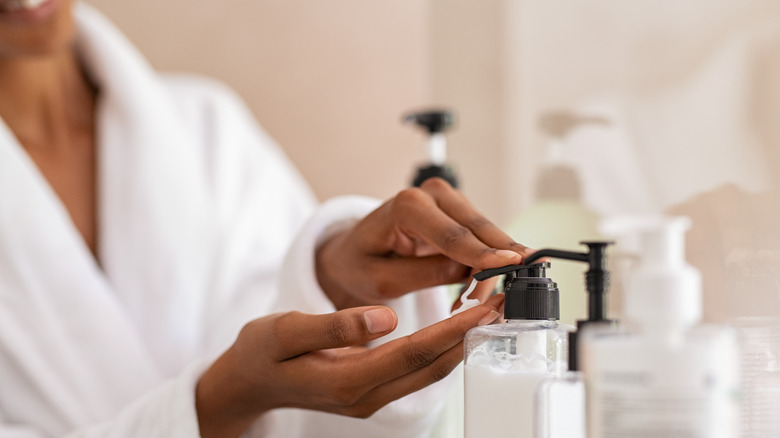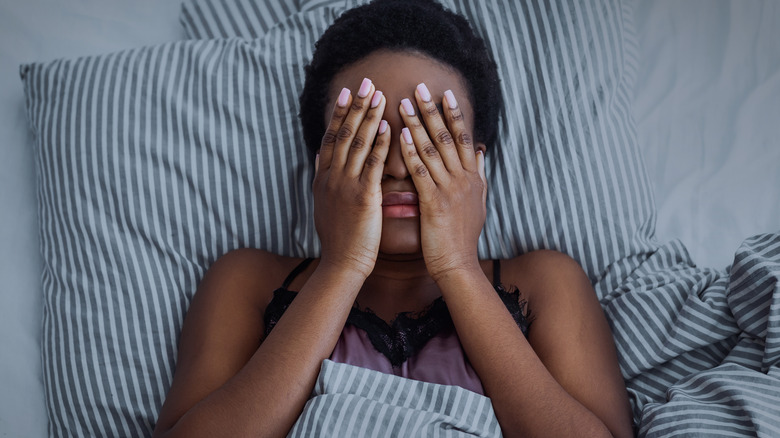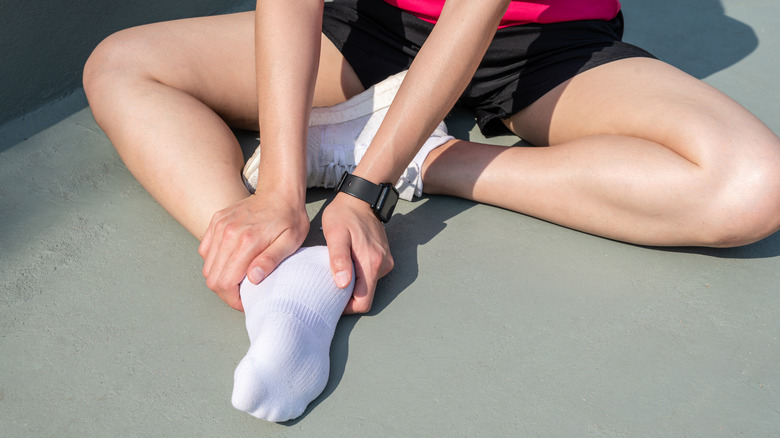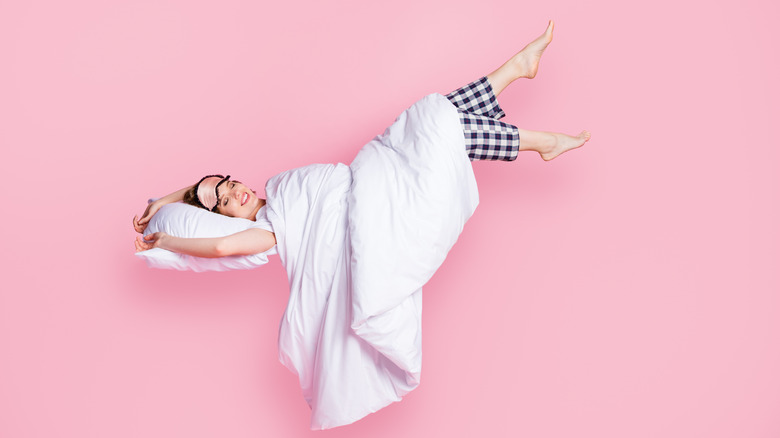What Happens To Your Body When You Sleep With Socks
More than one doctor has made waves on TikTok with a new piece of highly debated advice: wearing socks to bed can improve your sleep. For some, the idea of slipping on a pair of socks before dozing sounds like pure torture, calling to mind memories of socks lost in the abyss that is the foot of the bed or imagining overheating during the night. But when it comes down to it, what are the actual, science-based pros and cons?
Researchers say socks can improve everything from quality of sleep to the ability to orgasm, but getting all the benefits of sleeping with socks isn't as easy as putting on the first, mostly-clean pair you grab from the drawer. Both the material of the sock and its size make a big difference when it comes to opening up the world of benefits bedtime socks have to offer. Before committing to this new nightly habit, take a look at what scientists have to say.
Sleeping with socks can cool your body down, which ultimately leads to better sleep
The question of socks in bed went viral when Dr. Jess Andrade, a resident physician in Massachusetts and TikTok personality, posted a video explaining how wearing socks to sleep actually keeps you cool, rather than warm. While you might only opt for socks on particularly chilly nights, Andrade explained that, by warming your feet, you are actually helping your body reach a lower core temperature. According to Andrade, the act of warming your feet with socks "opens up the blood vessels that [cool] the body down."
But why is it important for your body to be cool during sleep? Andrade added, "The body being cool tells the brain that it's time for bed. So actually people that wear socks to bed tend to fall asleep faster."
According to Sleep.org, cooler core body temperatures are linked to feeling tired and ready for sleep. As Sleep.org explained, when the sun goes down, the release of melatonin in the brain is what makes us feel tired, which eventually "lowers your rate of metabolic heat production, which in turn causes your body temperature to gradually decrease." In short, the loss of body heat helps you go to sleep and stay asleep until the morning.
Wearing socks to bed can help you during intimacy
According to a 2005 study from the University of Groningen in the Netherlands, wearing socks can increase a couple's chance of orgasm quite drastically. The study assessed 13 heterosexual couples, between the ages of 19 and 49, and their brain activity during orgasm (both genuine and fake). One surprise finding: couples wearing socks increased their chances of orgasm from 50 to 80 percent, as reported by the BBC.
In 2021, Shape magazine took a second look at this often-cited study, noting, "A hard-to-locate study done with just 13 couples isn't exactly the epitome of scientific proof." Shape turned to other experts in the field for insight, but they reached similar conclusions about socks in bed. As one sex and intimacy coach, Irene Fehr, told Shape, "On the very basic biological survival level, coldness is experienced as danger in the body, which triggers it into a fight or flight response — and that's the opposite of the relaxation response that's needed for orgasm."
Notably, Chatel also made the point that sporting socks during sex is not a silver bullet; partners should also feel emotional security as well as physical security.
Suffer from hot flashes? Socks can help
Most scientists are in agreement that socks help regulate core body temperature, so it's unsurprising they recommend turning to a trusty pair when that core temperature gets out of whack — namely, during a hot flash.
According to Mayo Clinic, hot flashes, or sudden feelings of warmth in the face, neck, and chest, are brought on by hormonal changes taking place as a result of menopause. While researchers are still working to get to the bottom of the exact reason for why these hormonal changes lead to hot flashes, Mayo Clinic reported, "Hot flashes occur when decreased estrogen levels cause your body's thermostat (hypothalamus) to become more sensitive to slight changes in body temperature. When the hypothalamus thinks your body is too warm, it starts a chain of events — a hot flash — to cool you down."
As Dr. Jess Andrade mentioned in her TikTok, wearing socks to bed can help do exactly that — work to keep your body cool through the night. Medical News Today takes this advice one step further by advising women going through menopause to try adding socks to their nightly routine in an effort to keep night sweats at bay.
Socks can improve your overall sleep quality
Remember the days of studying the Sleep Cycle app, only to wake up horrified by seemingly terrible sleeping patterns? Socks can help that chaotic sleep chart finally settle in the "deep REM" stage. Studies show socks can help you fall asleep faster, lessen the number of times you wake up in the night and lengthen total sleep time.
In one 2018 study published in the Journal of Physiological Anthropology, researchers aimed to "evaluate the effect of feet warming using bed socks on sleep quality and thermoregulatory responses during sleep in a cool environment." In other words, researchers hoped to uncover the body's biological response to sleeping with socks. While the study was conducted on just a few adult men, the conclusion was clear: Sleeping with socks improved overall sleep quality and efficiency in research subjects. However, it's worth noting researchers also found sleeping with socks "had no significant influence on core body temperature," which conflicts with commonly-held medical insight.
Wearing socks to bed provides an opportunity to soften your feet without the mess
Socks offer benefits beyond simply improving your sleep. Suffer from cracked heels in the summertime? Don't sleep on those calluses (pun intended). According to Everyday Health, cracked heels can lead to "pain, bleeding, and infection." Alan K. Mauser, D.P.M., a Louisville, Kentucky podiatrist, told Everyday Health that keeping the skin on the feet moisturized is a "constant diligent job," advising folks that they should regularly reduce callus tissue "either manually or chemically."
As far as manual processes go, wearing socks at night can help. Among a number of at-home remedies, Everyday Health suggested moisturizing feet prior to bed and using socks to lock in the lotion. Not only will this help your feet stay smooth throughout the year, but you'll avoid the mess that comes with waiting for thick moisturizers like Vaseline to sink into the skin.
Wearing socks to sleep can help reduce symptoms of insomnia
Back again to the circadian rhythm and regulating that core body temperature. According to one 2010 study published in Cancer Nursing, warming the feet roughly 20 minutes before bed can help reduce symptoms of insomnia. Furthermore, if socks are not doing the job of keeping you asleep at night, try warming your hands before bed as well. Similarly, a 2006 study yielded positive results from warming the hands before bed.
In one 2016 study published in the Journal of Family Medicine and Primary Care, 33 percent of adults sampled suffered from chronic insomnia and 27 percent of those patients failed to identify the condition themselves, which often translates to the condition being missed by primary care physicians.
If you've been diagnosed with chronic insomnia, or you are suffering from loss of sleep, socks might be worth a try. While they are not the only strategy for reducing symptoms of insomnia, nor are they a cure-all, research shows wearing socks can offer much-needed relief when sleep just won't come.
The type of sock matters, and it might cost you
Fuzzy socks may be your go-to for comfort, but before jumping into bed with your feet cozied up in a new pair, make sure it's the right one. Most experts recommend breathable fabrics like cashmere and wool as the best option for socks meant to regulate night-time body temperature. But a pair of pure wool or pure cashmere socks can range from $25 to the hundreds, just for a single pair.
The sock market, as it were, is well aware of the health benefits of wearing socks to bed, and it's begun to advertise specific pairs as "bed socks," meaning these socks are not meant to be worn outside the home, or even outside the bed. As GQ put it, "In other words, cashmere socks are more of ... an indoor cat."
When it comes to pricing, GQ adds that while there are cashmere blends to be had for less than $50, "the entry point for a worthwhile pair of unadulterated, 100% cashmere socks generally floats around $60." Prices only go up from there.
Wearing socks to bed could compromise your foot hygiene
If your bed socks never touch the ground, they may seem like an item that requires very little — if any — washing. After all, if those socks never meet the ground outside or see the inside of a shoe, are they ever really dirty? The answer is yes, yes they are. And without regular washing, your bed socks could quickly become a safe haven for harmful bacteria.
According to FiveThirtyEight, your socks could play a key role in both bringing on and preventing fungal infections like athlete's foot, a condition that can lead to scaly, itchy areas on the foot. Athlete's foot often occurs "in people whose feet have become very sweaty while confined within tightfitting shoes," according to Mayo Clinic. FiveThirtyEight suggests two solutions to avoiding athlete's foot: Wear sandals, or change your socks regularly. How often, you ask? The American Cleaning Institute recommends washing your socks after every single wear — and it does not make any notable exceptions for "bed socks."
Wearing socks during your sleep can also lead to poor circulation
While the right pair of socks can encourage proper blood flow during the night, socks that are too tight or that lack breathability can have the opposite effect. If your favorite bedtime pair are too tight, all those circulatory and circadian benefits of socks in bed will be reversed. As Healthline put it, socks that are tight-fighting "might constrict circulation and hinder proper warming of your feet."
If you are unsure about your own socks, Healthline offered alternatives, including treating your feet to a short massage before bed or adding a "natural circulatory booster" to your moisturizer. Or, for a true extra boost of circulatory power, try warming up your socks before sliding into bed (Healthline advised sitting on the socks or safely using a blow-drier to warm them). No matter the route you choose, remember: just as the material of your bed socks makes quite a difference in their efficacy, so too does their tightness.
Your feet might need a break from socks
Socks play a crucial role in foot health — they absorb moisture, prevent blisters, and stave off calluses — but that doesn't mean your feet need them 24/7. According to Parkview Health, a non-profit, community-based health organization, the ideal time of day to give your feet "a chance to air out" is in the evening.
Socks are necessary when it comes to wicking away moisture from the feet (each foot is home to roughly 125,000 sweat glands, per UC San Diego Health), and without regular use, you put your feet at risk for a host of complications — odor and infection not least among them. With this in mind, finding a time to separate your foot from the sock is essential, and the evening hours spent around the home are a great option.
Of course, if you do feel socks improve your overall sleep quality, you can always strike a balance between donning socks some nights and going barefoot on others. The choice is yours!
